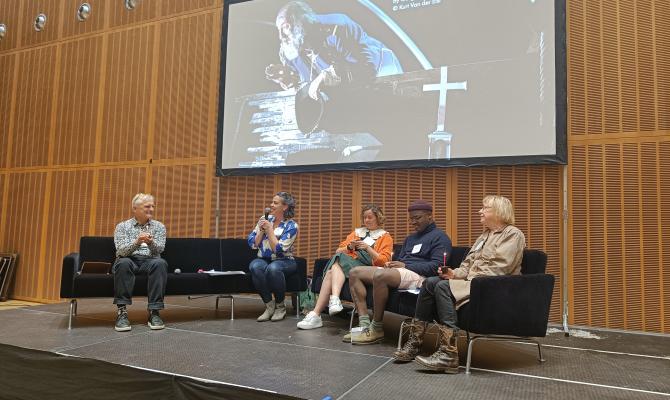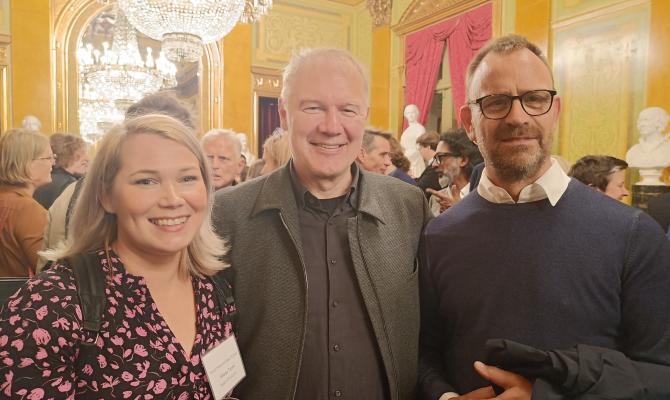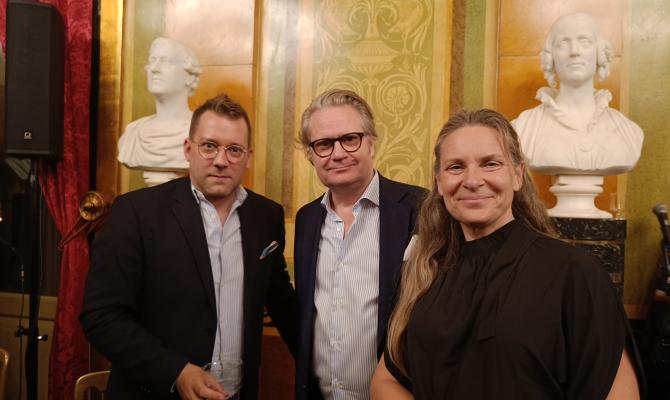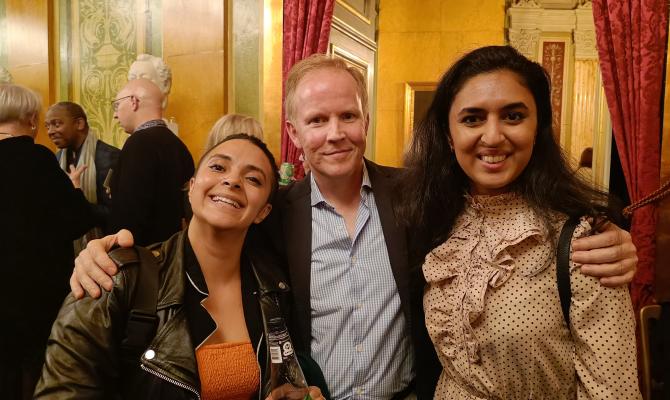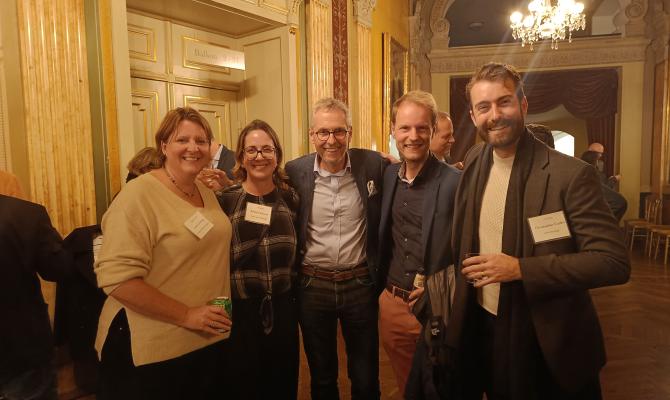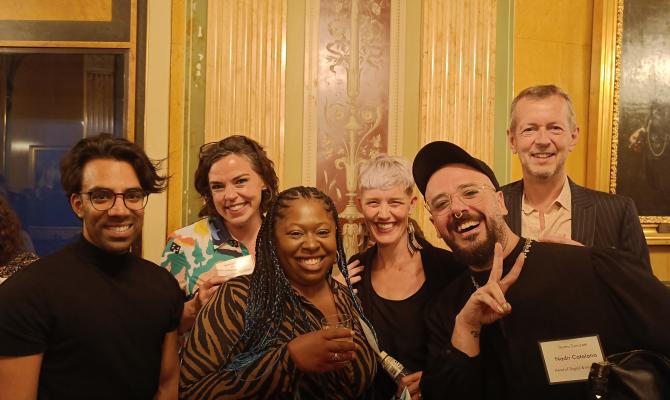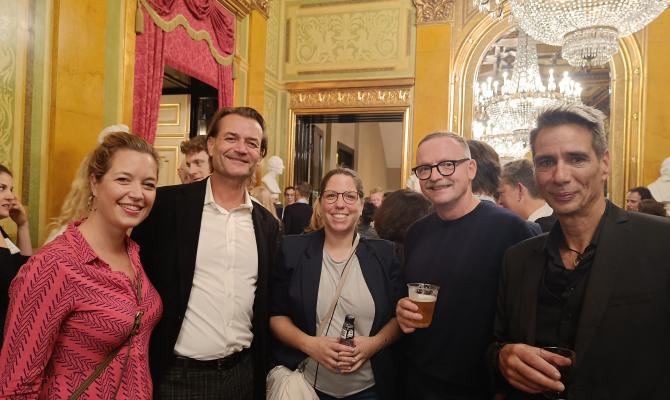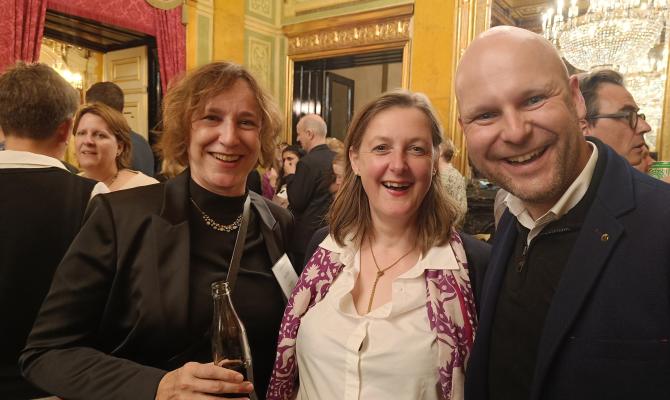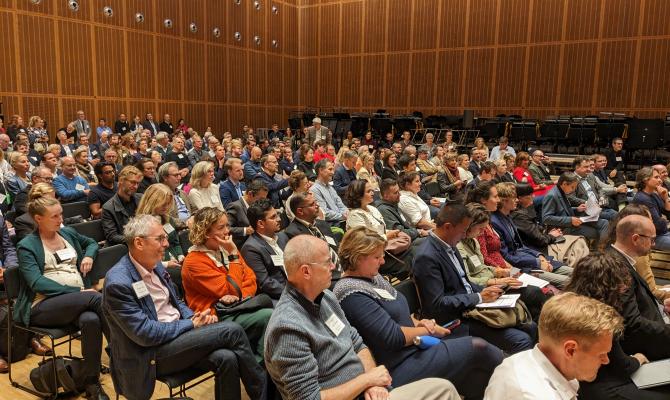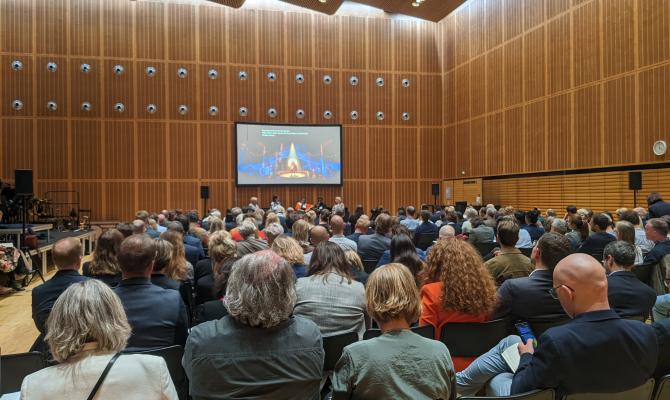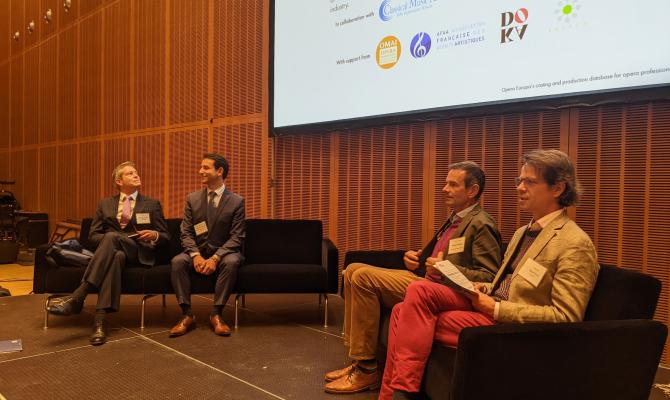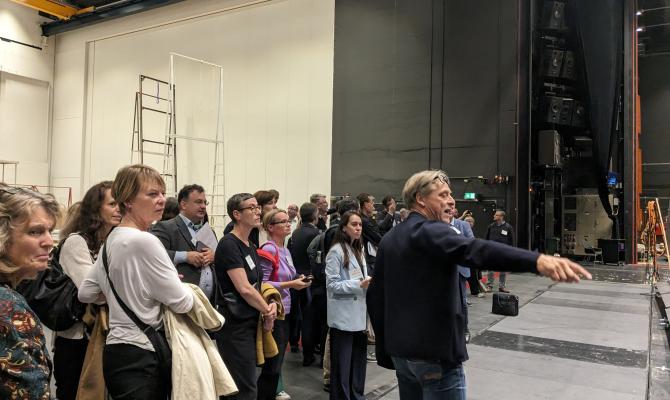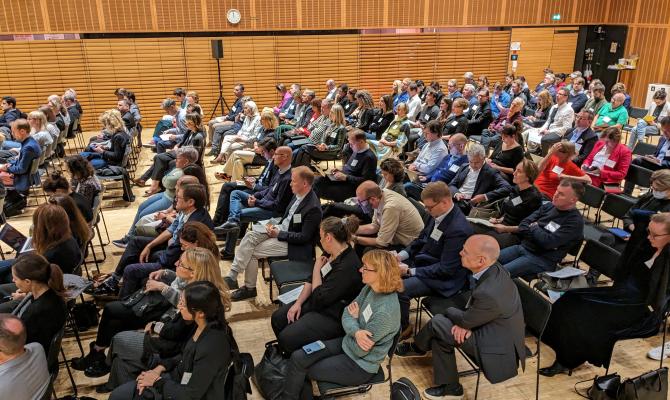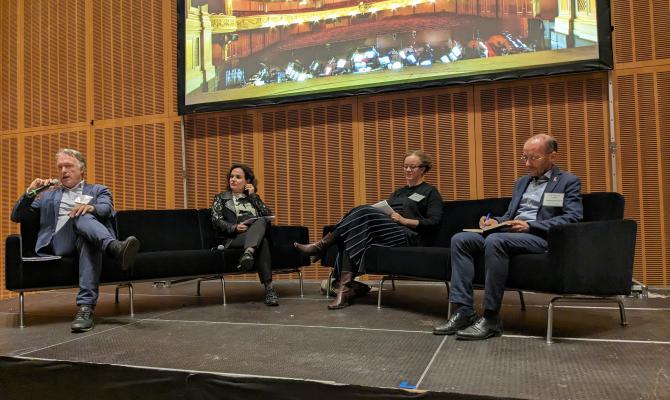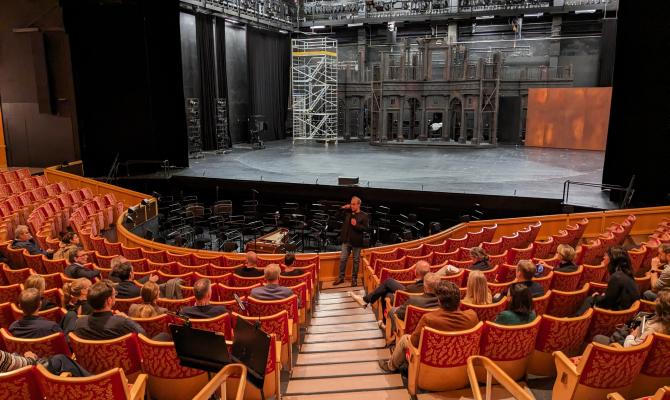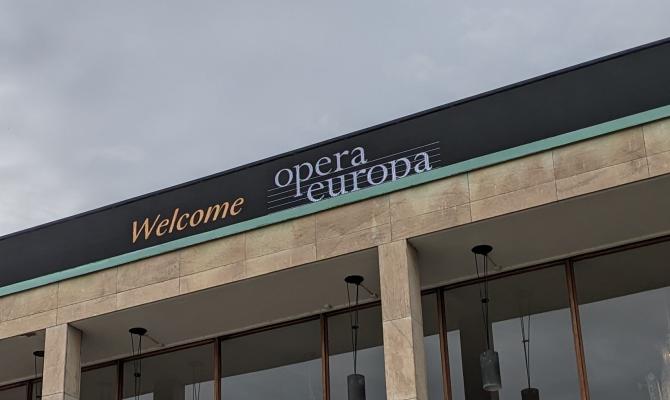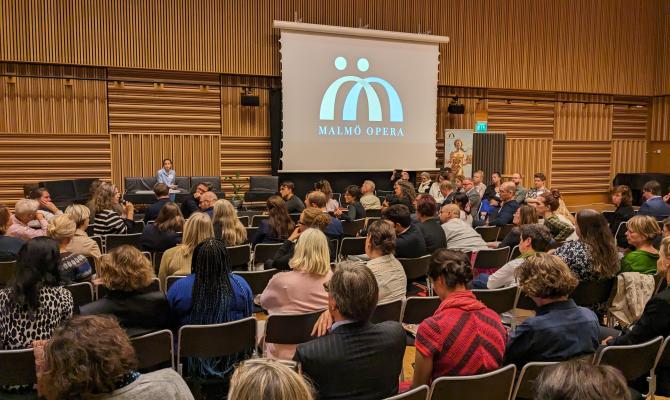The first day of the conference in the spectacular Copenhagen Opera House was opened by Kasper Holten, CEO of Det Kongelige Teater. His keynote speech was an engaging, inspiring, thought-provoking, and witty presentation of his view on the challenges of running an opera house today. How are we relevant while competing with other forms of arts and entertainment, many of which did not even exist for most of opera’s 400 years’ history? How should we address different groups in a changing society? How to manage an institution in a difficult environment, so that it remains financially stable and efficient? Kasper’s speech was a perfect kick-off for this year’s programme based around the big question: how should we steer our “ships” across troubled waters?
‘Make a wish for encouraging creation in opera’ was a request from the moderator Hannah Griffiths to the speakers of the first session, who ‘blew candles’ for operas to become more sensitive and relevant to the present time and its challenges. The challenges include generating many new positions in the coming years and giving rise to promising artists who could enjoy long and prosperous careers, all that while fostering collaboration and connection with the audience. Emerging artists require support, mentorship, and guidance as they take their first steps in the industry, and a creativity-fostering environment is needed. They also need the necessary time and space to develop their craft and should be supported from a ‘slow-cooking’ perspective. We should all aim to be workplaces that permit experimentation and risk-taking, where artists can fully express themselves without the fear of failure. In terms of audience development, the houses are encouraged to move new productions from smaller stages to their main ones and stay away from the safety of traditional, well-known operas. This shift in thinking, from ‘getting an audience' to 'creating an audience', is essential.
Simultaneously with the main sessions, the Copenhagen Opera House hosted a meeting of our Technical & Production forum, which took place over the first two days of the conference. Technical managers from a number of member companies discussed the challenges of planning and financing renovations, technical modifications, and refurbishments in their houses. They tried to define the balance between efficient production and resource compression, as well as address the topic of diversity within technical teams. This part of the conference included a fascinating tour of the house’s impressive backstage spaces.
The participants of the first session of the second day of the conference represented some of our member companies leading in sustainability-oriented transformation. What’s one of the most burning issues for opera houses worldwide? The financial impact of rising energy costs and sustainable production choices. The companies have searched for, and very often successfully applied, innovative ways to limit electricity consumption. What was very clear was a difference in the situation of some companies based on their countries’ energy supply structure, such as the proportion between fossil fuels and renewables (France vs. Sweden). The ideas for tackling such challenges included technical innovations for the buildings and stages, as well as more innovative activities, such as partnerships with public institutions and energy suppliers.
Unfortunately, more and more of our members face challenging cuts and, at the same time, have to cultivate public support. One of the main sessions was all about that burning issue and was an exhilarating discussion that engaged the whole room. What made it even more interesting was the participation of Steinunn Ragnarsdóttir of the Icelandic Opera, which is currently struggling because of the proposed short-term funding cuts. We all agree that creating a widely applicable advocacy tool would be a good strategy for such challenges, which aligns with Opera Europa’s recent decision to establish a relevant board committee.
Who are the young people choosing a career in opera, and what kind of training should be offered to them? How can young artists’ programs be creative in ensuring the sustainability of our art form? The World Café on Young Artists’ programmes gathered diverse feedback and perspectives from emerging performers themselves and from houses that are either initiating or have had a long-standing framework for emerging performers. This includes creating a safe environment where artists can express themselves, experiment, and make mistakes. The audition process should be designed to allow sufficient time for getting to know the artists while also considering diversity and inclusion. Mentorship and ongoing relationships with artists after they graduate from our programmes are crucial; participants should be encouraged to mobility between different opera companies. One of the recommendations suggested that Opera Europa could also act as a resource and support network for emerging artists.
Are competitions an underestimated partner for the future of the opera industry? The speakers on the panel referred to it as “the necessary evil’. They view it as something between an effective way for artists to expose themselves and as a way of devaluing the art. Competitions were created to give a chance for anyone to be exposed to the industry, which is no longer the case today with social media. As competing in art is purely subjective, can there be a holistic metric test of how the songs are to be interpreted? Rather than needing a trigger warning before the word ‘competition’, the experience should be an enriching one.
The costs of opera productions have been on the rise, particularly in the aftermath of the Covid-19 pandemic. Opera houses and theatres worldwide endured devastating losses and financial burdens during that period. Nevertheless, another session addressed the present phase of recovery and actively seeking alternative sources of income to ensure long-term sustainability. This includes partnering with business leaders, cultivating relationships with friends and supporters, and exploring new avenues. To make opera houses more appealing to investors and business partners, the freshness and innovativity of projects should be a key factor. Sustaining long-term partnerships with these collaborators is critical. This can be achieved by regularly inviting them to participate, adapting projects to keep them involved, and investing sufficient time and management in realising their shared interest in art as a means to enrich society. Houses are also cutting costs through co-productions and rentals, and finding new income in merchandising, tours, special events, and dining experiences.
The evening performance of Don Giovanni at Malmö Opera, the wonderfully hospitable host of the final day of the conference, was the perfect opportunity to open the Artistic & Production forum sessions with a discussion on gender and racial stereotypes in opera. Soprano Natasha Agarwal reminded the audience that there is nothing to be gained from typecasting; singers of colour should have the opportunity to be cast in all roles. While it’s wonderful to represent one’s own culture through opera, it can’t be the only space for the singer to exist in. One of the key points of the session was to acknowledge that diversity should not be limited to only casting - the people who make the creative decisions should be well-acquainted with the cultures being represented in the productions since stereotypes stem from insufficient understanding. It’s not about right or wrong decisions: it’s about dialogue. ‘Nothing about opera is particularly realistic, so in terms of casting it really can’t be compared to TV and films, where families are expected to look the same; on stage, we have to trust the audience to use their imagination’, Natasha told the applauding audience.
The session on a safe production environment was mainly about the use and benefits of a code of conduct for guests and staff. Having a formal code of conduct is a way to express commitment to ensuring all staff and guests are treated with dignity and respect. Some houses presented their code of conduct to the staff by addressing it verbally, for example at the start of a rehearsal period, or by presenting a document to be signed at the start of the employment. The houses that took part in the panel provide their staff with the possibility to report inappropriate behaviour via anonymous reporting. During the discussion, many participants agreed that it could be useful to create a definition of responsible behaviour so it’s clear to the staff what the desired values of the house are: i.e integrity, honesty, appreciation, respect, politeness, inclusiveness, fairness and creativity with free expression were mentioned. However, it should be kept in mind that conflicts due to work-related decisions or interpretations, and justified disciplinary action should not be considered inappropriate behaviour.
The next AAP session regarded producing with an intimacy coordinator for delicate scenes involving nudity, sexual activity, or abuse, with case examples from France and New Zealand. The main goal of an intimacy coordinator is to increase the level of knowledge to ensure a safe, respectful environment when working on intimate scenes to reduce the risks involved. The very start of the process is to define the scene's context and what it aims to convey based on an objective assessment. The intimacy coordinator acts as a dialogue partner for the director to tell the story they want to tell safely.
During the final AAP session, St. Gallen’s and Malmö’s representatives tried to answer the question of how to manage the unpredictable, tackling stress and overtime within the production process. Improving the management’s communication within all departments was a key issue. Knowing when to say “no” to something is crucial beyond measure. Malmö Opera aims for not more than 3 productions going on at the same time, ensuring staff is vital and motivated. Giving the technical team strict hours of their time for each department at the start of a production is one example of efficient communication within the company.
In parallel with the AAP sessions, Malmö was also a place of the Audio-Visual & Digital forum meeting. The presentations revolved around new filming techniques aimed at providing more immersive experiences. The focus was on strategically placing cameras closer to the stage without disturbing the audience and the performers. Excerpts were showcased to illustrate these techniques, which involved a mix of rehearsal shots with on-stage cameras and live performance shots using cameras placed among the audience to create immersive videos. Two primary topics from the realm of digital opera were also explored: the use of specialised apps for the audience, and the concept of Metaverse. Irish National Opera presented the Isolde app: a cloud-based solution designed to manage and synchronise shared audio and visual experiences for artistic productions, with the goal of making opera more accessible and open to new audiences. Another key question addressed was how to make opera more appealing to young people and to align it with their interests. The Metaverse project aimed to achieve this by creating an opera experience similar to gaming, focusing on 3D immersion rather than traditional streaming. This project is intended to connect people from different parts of the world to achieve a global impact. It employs personalised avatars and an interactive live chat within an entertaining one-hour opera to engage and captivate younger generations.
The Autumn conference was an unquestionable success. Over the course of three sunny October days, 380 participants took part in 25 sessions in two beautiful Scandinavian cities. We know where we stand and what challenges lie ahead. See you in Vienna!



